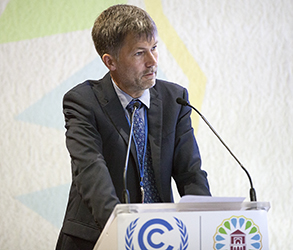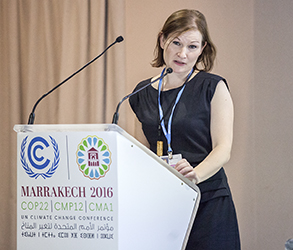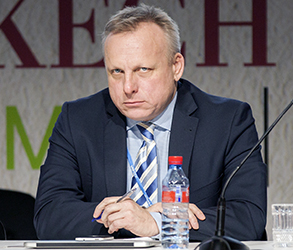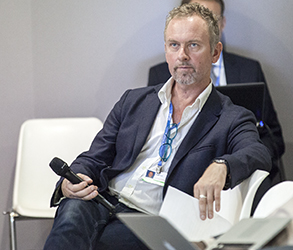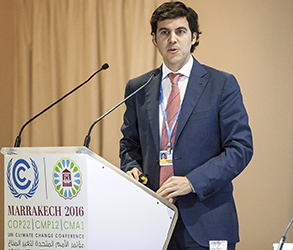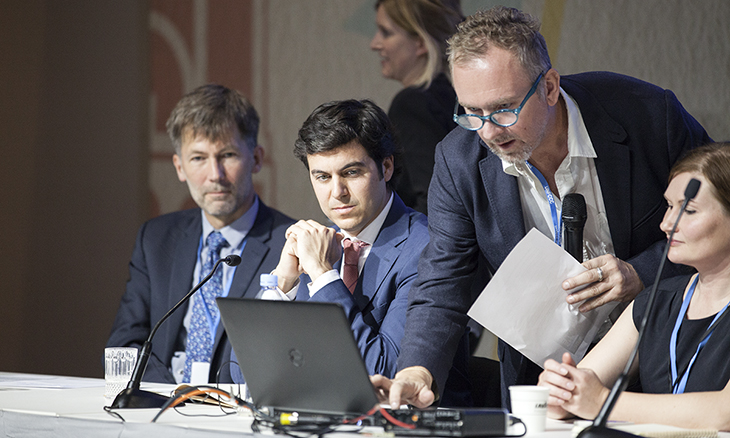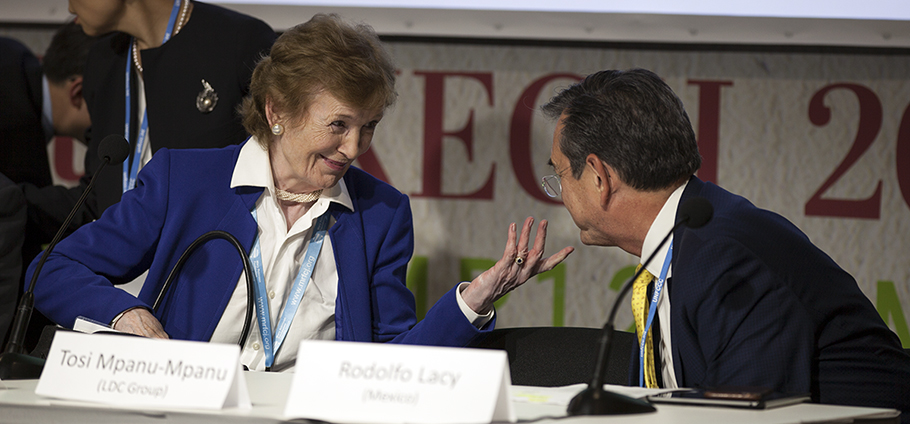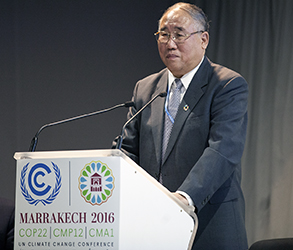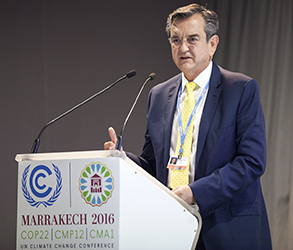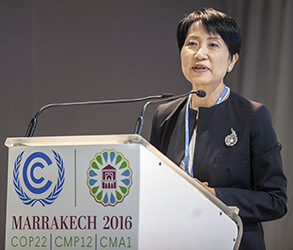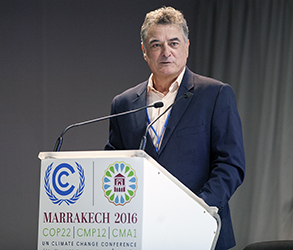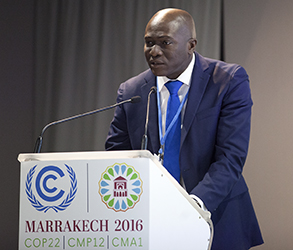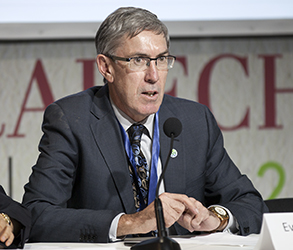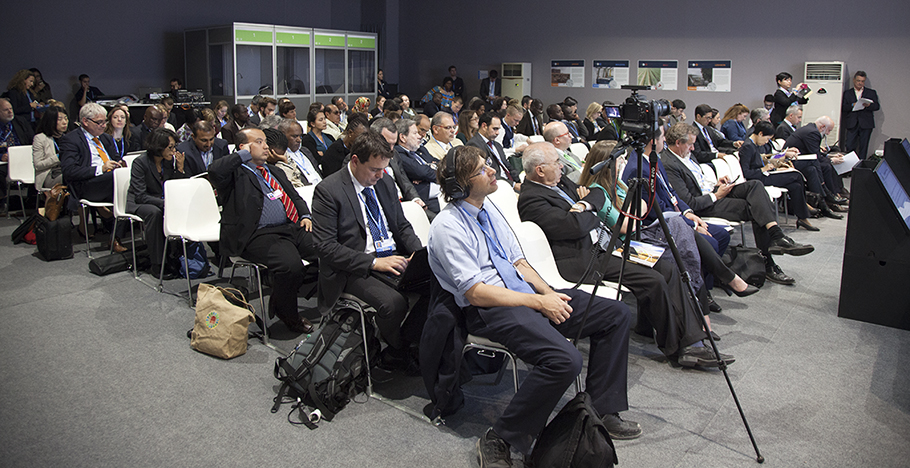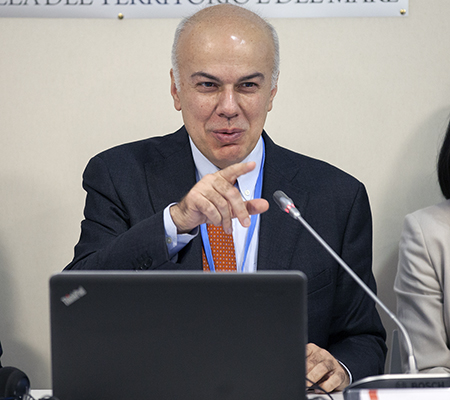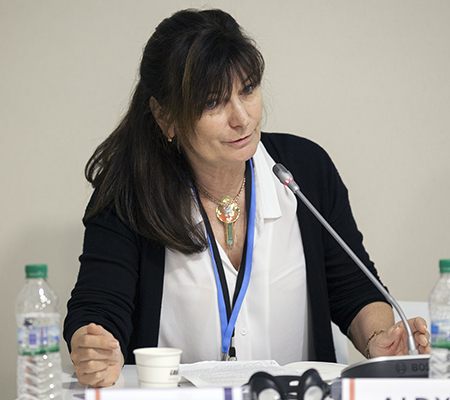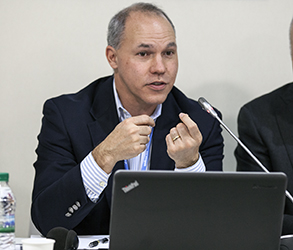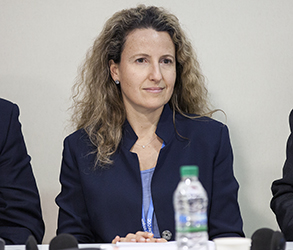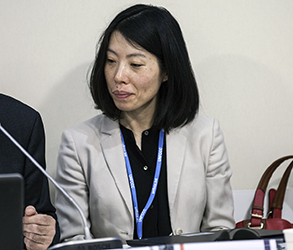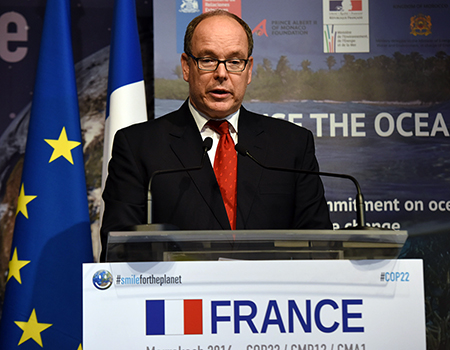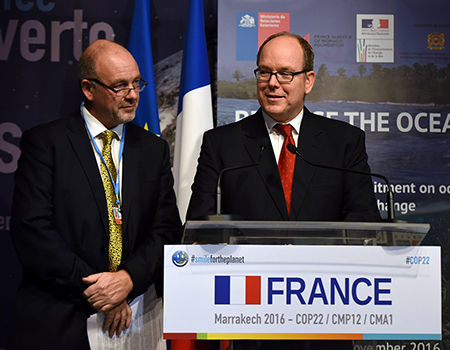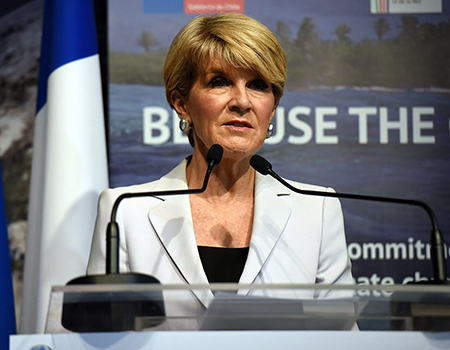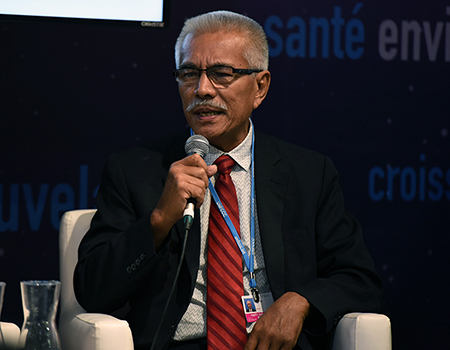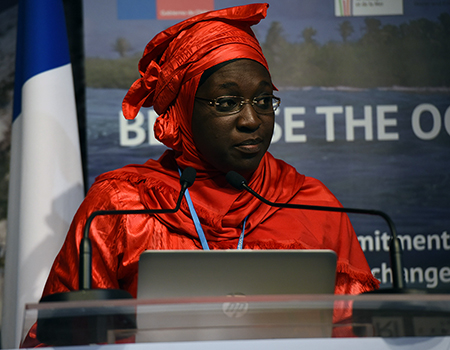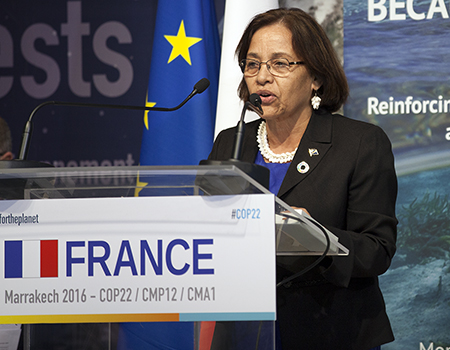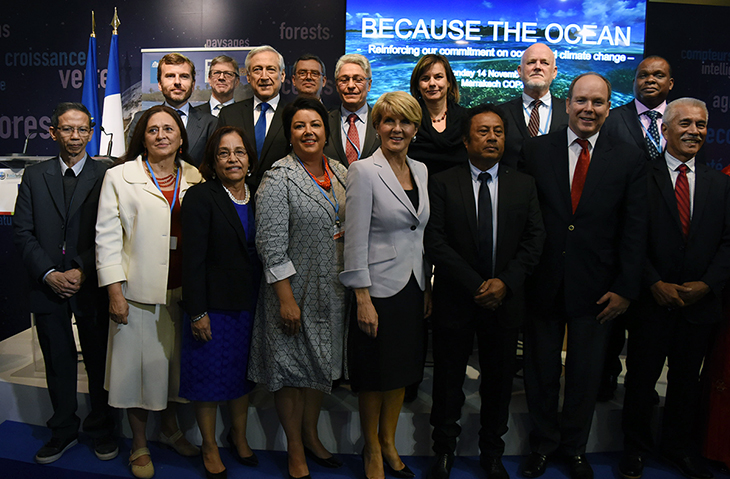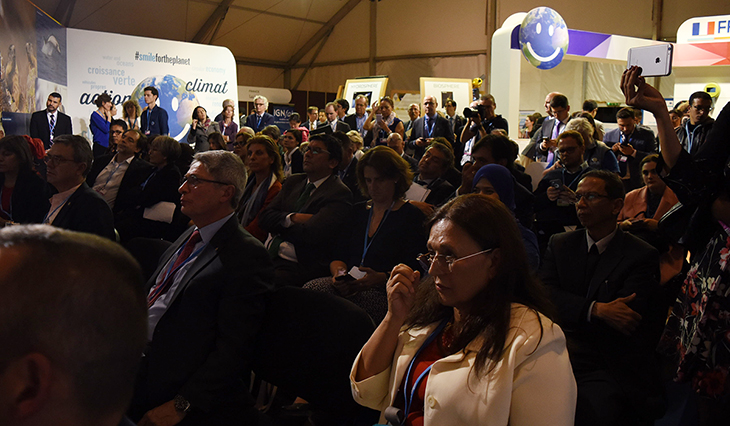Summary
The following side events were covered by ENBOTS on Monday, 14 November 2016:
- Nationally Appropriate Mitigation Actions (NAMAs) as a Tool For (I)NDC Implementation – Lessons Learned and Plans Ahead
- Implementing the Paris Agreement: What Do Countries Need from the Financial Mechanism?
- Urban Policies to Implement and Finance NDCs
- Because the Ocean
IISD Reporting Services, through its ENBOTS Meeting Coverage, is providing daily web coverage from the Marrakech Climate Change Conference - November 2016.
Photos by IISD/ENB | Mike Muzurakis and Kiara Worth
For photo reprint permissions, please follow instructions at our Attribution Regulations for Meeting Photo Usage Page
Nationally Appropriate Mitigation Actions (NAMAs) as a Tool For (I)NDC Implementation – Lessons Learned and Plans AheadPresented by the Nordic Council of Ministers
The session was introduced by Annika Rosing, Nordic Council of Ministers, and moderated by Michael Funch, Nordic Council of Ministers.
Asger Garnak, Ministry of Energy, Utilities and Climate, Denmark, stressed that even though NAMAs do not appear in the Paris Agreement, they are important because they helped develop approaches, capacity and experience that will be at the core of Nationally Determined Contribution (NDC) implementation. He stressed that NAMAs should be ambitious, transformational and supportive.
Hanna-Mari Ahonen, GreenStream, underscored projects in Peru and Viet Nam. She highlighted key elements for NAMA success, including host country ownership, involvement of local stakeholders, use of existing structures and ensuring an enabling policy environment. She underscored high quality NAMA proposals as crucial for attracting international funding, and stressed NAMAs should include different types of actions with different time horizons.
Inga Zachow, Deutsche Gesellschaft für internationale Zusammenarbeit (GIZ), noted that one in three developing country NDCs refer to NAMAs. She used case studies to illustrate the linkages between NAMAs and NDCs, including cement and renewable energy in Tunisia and transport in Viet Nam. She identified the key lessons as, inter alia: embedding NAMAs into a long-term vision; stakeholder engagement including lead institutions; and promoting local technical capacity. She stressed NAMAs can be a key implementation vehicle for achieving NDCs.
Alberto Galante, Managing Director, Climate Perspectives, identified NAMAs as one of the key pillars of NDCs. He emphasized that much experience has been gained with NAMAs on barriers, baselines, Measurement, Reporting and Verification (MRV), and financing needs. He described his organization’s support to developing country mitigation policies and a multi-criteria tool for the assessment of NAMAs.
Stan Kolar, Center for Clean Air Policy (CCAP), said the three key elements of NAMA success are: a well-defined financing mechanism; a pipeline of bankable projects; and a clear long-term transformational impact. He stressed climate finance is not about supporting projects that are already economically viable, but about removing barriers, suggesting that a balance is needed between what is transformational versus what it is feasible.
Issues considered in the ensuing discussion included: how to address the private sector in the NAMAs process; capacity building; and risks.
From L-R: Asger Garnak, Ministry of Energy, Utilities and Climate, Denmark; Alberto Galante, Managing Director, Climate Perspectives; Hanna-Mari Ahonen, GreenStream; Stan Kolar, Center for Clean Air Policy (CCAP); and Inga Zachow, GIZ
Asger Garnak, Ministry of Energy, Utilities and Climate, Denmark, noted the elaboration of a NAMA for the sugarcane sector in Mexico.
Hanna-Mari Ahonen, GreenStream, said projects should ensure long-term financiasl sustainability and include phase-out of international support.
Inga Zachow, GIZ, emphasized a transport sector NAMA in Viet Nam, including low-carbon bus technologies, operational improvements and improved public transport.
Stan Kolar, CCAP, noted that many NAMAs are not yet developed enough to be financed by development institutions.
Michael Funch, Nordic Council of Ministers, moderated the event.
Alberto Galante, Managing Director, Climate Perspectives, said all mitigation instruments are tools for NDC implementation, including NAMAs.
Contacts:
- Ms. Outi Leskelä | outi.leskela@ym.fi
- Mr. Ash Sharma | ash.sharma@nefco.fi
More Information:
Implementing the Paris Agreement: What Do Countries Need from the Financial Mechanism?Presented by the Global Environment Facility (GEF)
The event was introduced by Naoko Ishii, CEO and Chairperson, GEF, who said the objective was to hear directly from countries about their needs from the Financial Mechanism for implementation of the Paris Agreement. Gustavo Fonseca, Director of Programs, GEF, moderated the event.
Xia Zhenhua, Special Representative on Climate Change, China, underscored cooperation between China and the GEF on climate change and environmental protection. He highlighted China’s efforts to help other developing countries get financial assistance from the GEF, including through capacity building. He highlighted discussions among China and the GEF about South-South cooperation, and stressed that adaptation is the overriding priority for this cooperation.
Mary Robinson, UN Secretary-General’s Special Envoy for El Niño and Climate, said climate finance needs to move from the billions to the trillions of dollars. She underscored the “triple trap” of climate change, fossil fuel dependence and debt. She said financial flows need to reach local implementers and especially women. Robinson underscored that climate finance should be counted as disbursed funds, not pledged funds, emphasizing that fulfillment of financial commitments is critical to maintaining trust in the UNFCCC process.
Tosi Mpanu-Mpanu, Chair, Least Developed Countries (LDC) Group, said access to finance includes building capacity upstream and downstream of the project approval process. He underscored that, over the years, National Adaptation Programmes of Action (NAPAs), Nationally Appropriate Mitigation Actions (NAMAs) and now Nationally Determined Contributions (NDCs) are underfunded, noting how 32 LDC NAPAs cleared by the Secretariat are still awaiting funding. He noted that many LDCs are already spending resources on climate action and highlighted that the new climate finance narrative is not in billions, but trillions.
Rodolfo Lacy, Mexico, said climate negotiations should also address air pollutants. He urged more interactions between environmental treaties on climate change following recent decisions under the Montreal Protocol on Substances that Deplete the Ozone Layer and International Civil Aviation Organization (ICAO). He said the GEF should finance projects that address environmental issues in a holistic way.
In responding to presenters, Ewen McDonald, Co-Chair, Green Climate Fund (GCF), said the GCF has funded proposals for over one billion dollars. He underscored the importance of country ownership and capacity building. He highlighted GCF support to 57 developing countries to develop climate plans. McDonald said it is imperative to achieve complementarity and coherence among the GCF, GEF and other funds. Ishii underscored capacity building, adequacy and predictability of money, integration of climate action into national development strategies and finding a systematic approach for South-South cooperation.
In the ensuing discussion, participants addressed, among others, streamlining finance procedures, channeling climate finance through national institutions and the role of regional organizations in helping countries access climate finance.
Mary Robinson, UN Secretary-General’s Special Envoy for El Niño and Climate, urged contributions to the Least Developed Countries Fund (LDCF).
Xia Zhenhua, Special Representative on Climate Change, China, said his country is taking the lead in using financial resources provided by the GEF to promote policies, regulations, mechanisms and capacities.
Rodolfo Lacy, Mexico, emphasized conservation of ecosystems as an adaptation strategy.
Naoko Ishii, CEO and Chairperson, GEF, underscored the need for adequacy and predictability of climate finance.
Gustavo Fonseca, Director of Programs, GEF, moderated the event.
Tosi Mpanu-Mpanu, Chair, LDC Group, underscored that all LDCs have submitted NDCs.
Ewen McDonald, Co-Chair, GCF, announced the establishment of an annual dialogue to develop a coherence framework for climate finance delivery channels.
Contacts:
- Monica Fernandes (Coordinator) | mfernandes@thegef.org
More Information:
Urban Policies to Implement and Finance NDCsPresented by the Center for Research on Energy and Environmental Economics and Policy (IEFE) and the University Luigi Bocconi of Milan/Fondazione Eni Enrico Mattei (FEEM)
Edoardo Croci, IEFE, who moderated the event, noted that the role of subnational governments is relevant in the sustainable development arena, which has been recognized in the Addis Ababa Action Agenda (AAAA), Sustainable Development Goals (SDGs), Paris Agreement and the New Urban Agenda. He stressed that this comprises an integrated framework for climate change action and sustainable development, stressing the need for cooperation to access climate finance at the urban level.
Isabella Alloisio, FEEM, underscored research on urban climate finance. Noting that cities are responsible for 75% of global energy consumption and 80% of greenhouse gas (GHG) emissions, she stressed the importance for cities to transition to post-carbon urban areas. She said that more than 70% of financing for the global 2030 Agenda will have to be channeled to cities.
Joseph Aldy, Harvard University, emphasized the opportunities of leveraging research on behavioral economics to achieve effective urban climate policies. He noted that half the NDCs mention cities and urban environments. He underscored the Paris Agreement sections on non-party stakeholders and on carbon pricing. Aldy cautioned against potential effects of overlapping national and subnational policies, such as higher costs or lack of emissions reductions benefits. He stressed the importance of tailoring behavioral policies to the local context.
Natalie Le Denmat, Executive Secretary, United Cities and Local Governments (UCLG), underscored the need for finance for local action on climate resilience. She emphasized the need for an environment conducive to mobilization of local resources. She noted the need to improve financial management by local authorities, and suggested guarantees as a potential instrument for local finance mobilization.
Xiaomei Tan, Global Environment Facility (GEF), emphasized cities as a key element in achieving the 2°C target. She highlighted urban projects, including on heating and cooling, energy efficiency and LED lighting. She underscored financial mechanisms such as performance-based payments and rebates. She noted that GEF grants of over US$800 million have leveraged over US$10 billion in co-financing.
The ensuing discussion addressed, among other issues, leverage ratios for mobilization of private investment with public resources in cities and other sectors.
From L-R: Natalie Le Denmat, Executive Secretary, United Cities and Local Governments (UCLG); Joseph Aldy, Harvard University; Isabella Alloisio, FEEM; Eduardo Croci, IEFE; and Xiaomei Tan, GEF
Eduardo Croci, IEFE, highlighted various means of financing sustainable urban development, including green municipal bonds and payment for ecosystem services at the local level.
Natalie Le Denmat, Executive Secretary, UCLG, said the 2030 Agenda has made key strides towards recognizing the role of local governments.
Joseph Aldy, Harvard University, underscored that climate policies in cities can serve as experiments, with successful cases then replicated elsewhere.
Isabella Alloisio, FEEM, underlined the need for finance for local climate change mitigation and adaptation actions.
Xiaomei Tan, GEF, highlighted the GEF’s innovative financing models, including de-risking and incentivizing energy efficient technologies.
Contacts:
- Edoardo Croci (Moderator) | edoardo.croci@unibocconi.it
More Information:
Because the OceanPresented by Pavilion of France
Richard Black, Energy and Climate Intelligence Unit, moderated the event. He welcomed the commitments of the second “Because the Oceans” Declaration. His Serene Highness (HSH) Prince Albert II of Monaco noted progress made since the first Oceans Declaration in Paris, and invited new countries to sign the second “Because the Oceans” Declaration because the consequences of damages to the oceans will be felt worldwide. Tommy Remengesau, President of Palau, highlighted the need for partnerships to protect oceans, and invited more countries to sign the second “Because the Oceans” Declaration.
Hilda Heine, President of the Marshall Islands, underscored the need to synergize actions and find solutions to enable low-lying and island countries to live in their lands. Julie Bishop, Minister of Foreign Affairs, Australia, noted the importance of coral reefs for protecting coastlines and generating income. Peter Thomson, President of the UN General Assembly, invited all countries to participate in the high-level UN Conference on Oceans and Seas to be held in June 2017 to discuss climate impacts on oceans and how to achieve SDG 14 (conserve and sustainably use the oceans, seas and marine resources for sustainable development).
Anote Tong, Conservation International, hoped for an instrument similar to REDD+ to protect oceans. Isabella Lövin, Deputy Prime Minister of Sweden, said developing countries need help to implement the Paris Agreement and to coordinate efforts on fisheries management. Edgar Gutierrez, Minister of Environment and Energy, Costa Rica, underscored that marine resources are important for advancing our common goal to preserve ecosystems and livelihoods. Didier Dogley, Minister of Environment, Energy and Climate Change, Seychelles, noted the challenges climate change poses to the environment and people's survival.
Paula Bennett, Minister of Climate Change Issues, New Zealand, said that oceans are crucial for our livelihoods, and outlined her country's actions to protect oceans. Catherine Stewart, Ministry of Environment, Canada, underlined the importance of oceans and their management. Pablo Saavedra, Secretary of State for the Environment, Spain, noted the importance of ocean sustainable development and said the forthcoming Intergovernmental Panel on Climate Change (IPCC) special report will increase our knowledge on oceans and climate change. María Amparo Martínez Arroyo, General Director of the National Institute of Ecology and Climate Change, Mexico, noted the need to undertake more concrete actions at all levels to link all UN conventions and all goals to save our oceans.
Ramatoulaye Dieng, Secretary General, Ministry of Environment and Sustainable Development, Senegal, stressed the need to mainstream ocean actions to face climate change challenges. Achmad Poernomo, Senior Advisor to the Minister of Marine Affairs and Fisheries, Indonesia, underscored the importance of international cooperation to reach climate justice. Carlos Rafael Polo Castaneda, Ambassador of Peru to Morocco, noted the importance of oceans for Peru’s livelihoods. Françoise Gaill, National Centre for Scientific Research, France, noted the need to act to preserve oceans, which are part of the climate change solution. Heraldo Munoz, Minister of Foreign Affairs of Chile, noted progress in inserting oceans in UNFCCC negotiations since 2015.
HSH Prince Albert II of Monaco underscored the need to work together with civil society and all relevant actors to continue advancing knowledge on seas and oceans.
Richard Black, Energy and Climate Intelligence Unit, with His Serene Highness (HSH) Prince Albert II of Monaco
Julie Bishop, Minister of Foreign Affairs, Australia, outlined her country’s initiatives to protect the coral reefs.
Anote Tong, Conservation International, said Kiribati does not want to be flooded out of existence.
Ramatoulaye Dieng, Secretary General, Ministry of Environment and Sustainable Development, Senegal, outlined Senegal’s actions to fight illegal fishing and other initiatives to protect oceans.
Hilda Heine, President of the Marshall Islands, noted the importance of signing the “Because the Oceans” Declaration and noted that her country’s citizens have no intention to move from their island.
Group photo of the event participants
Contacts:
- Ines de Agueda (Coordinator) | ines@vardagroup.org
More Information:
About | 7 Nov | 8 Nov | 9 Nov | 10 Nov | 11 Nov | 12 Nov | 14 Nov | 15 Nov | 16 Nov |
17 Nov
|
18 Nov
|
Summary
The Earth Negotiations Bulletin on the Side (ENBOTS) © <enb@iisd.org> is a special publication of the International Institute for Sustainable Development (IISD). This issue has been written by Karen Alvarenga, Katherine Browne, Bo-Alex Fredvik, Tallash Kantai, Jennifer Lenhart, Ph.D., Kate Louw, Miquel Muñoz Cabre, Nicole de Paula, and Asterios Tsioumanis, Ph.D. The Digital Editors are Mike Muzurakis and Liz Rubin. The Editor is Elena Kosolapova, Ph.D. <elena@iisd.org>. The Director of IISD Reporting Services is Langston James “Kimo” Goree VI <kimo@iisd.org>. The opinions expressed in ENBOTS are those of the authors and do not necessarily reflect the views of IISD and funders. Excerpts from ENBOTS may be used in non-commercial publications only with appropriate academic citation. For permission to use this material in commercial publications, contact the Director of IISD Reporting Services at <kimo@iisd.org>. Electronic versions of issues of ENBOTS from the Marrakech Climate Change Conference - November 2016, can be found on the IISD Reporting Services website at http://enb.iisd.org/climate/cop22/enbots/. The ENBOTS Team at the Marrakech Climate Change Conference - November 2016, can be contacted by e-mail at <tallash@iisd.org>.
Specific funding for coverage of the Marrakech Climate Change Conference - November 2016, has been provided by the Ministry of the Environment and Protection of Land and Sea of Italy, and the Kingdom of Saudi Arabia
Specific funding for coverage of side events at the Marrakech Climate Change Conference - November 2016, has been provided by the Ministry of the Environment and Protection of Land and Sea of Italy, the Austrian Federal Ministry of Agriculture, Forestry, Environment and Water Management (BMLFUW), the Swiss Federal Office for the Environment (FOEN), the Kingdom of Saudi Arabia, and the European Union (EU)
IISD Reporting Services is grateful to the many donors of the Earth Negotiations Bulletin (ENB) and recognizes the following as core contributors to the ENB: the European Union, the Government of Switzerland (the Swiss Federal Office for the Environment (FOEN)), the Italian Ministry for the Environment, Land and Sea, and the Kingdom of Saudi Arabia. General Support for the Bulletin during 2016 is provided by the German Federal Ministry for the Environment, Nature Conservation, Building and Nuclear Safety (BMUB), the New Zealand Ministry of Foreign Affairs and Trade, SWAN International, the Finnish Ministry for Foreign Affairs, the Japanese Ministry of Environment (through the Institute for Global Environmental Strategies - IGES), the United Nations Environment Programme (UNEP), and the International Development Research Centre (IDRC). Funding for translation of the Bulletin into French has been provided by the Government of France, the Wallonia, Québec, and the International Organization of La Francophonie/Institute for Sustainable Development of La Francophonie (IOF/IFDD).
Resources for the Marrakech Climate Change Conference - November 2016
- Website for the Marrakech Climate Change Conference - November 2016
- Website for Side Events and Exhibits at the Marrakech Climate Change Conference - November 2016
- Schedule of Side Events at the Marrakech Climate Change Conference - November 2016
- Overview Schedule for the Marrakech Climate Change Conference - November 2016
- Host Country Website
IISD ENB/ENB+ Meeting Coverage
- 44th Session of the Intergovernmental Panel on Climate Change (IPCC-44), 17-20 October 2016, United Nations Conference Centre (UNCC), Bangkok, Thailand
- Bonn Climate Change Conference - May 2016, 16-26 May 2016, Bonn, Germany
- High-Level Signature Ceremony for the Paris Agreement on Climate Change, 22 April 2016, UN Headquarters, New York
- IPCC-43, 11-13 April 2016, Headquarters of the United Nations Environment Programme (UNEP), Nairobi, Kenya
- Paris Climate Change Conference - November 2015, 29 November - 13 December 2015, Paris, France
- Coverage of Side Events at the Paris Climate Change Conference - November 2015, 29 November - 11 December 2015, Paris, France
- Bonn Climate Change Conference - October 2015, 19-23 October 2015, Bonn, Germany
- IPCC-42, 5-8 October 2015, Dubrovnik, Croatia
- Bonn Climate Change Conference - August 2015, 31 August - 4 September 2015, Bonn, Germany
- Bonn Climate Change Conference - June 2015, 1-11 June 2015, Bonn, Germany
- Coverage of Side Events at the Bonn Climate Change Conference - June 2015, 1-11 June 2015, Bonn, Germany
- 9th Meeting of the Green Climate Fund (GCF) Board, 24-26 March 2015, Songdo, Republic of Korea
- IPCC-41, 24-27 February 2015, UN Environment Programme (UNEP) headquarters, Nairobi, Kenya
- Geneva Climate Change Conference - February 2015, 8-13 February 2015, Geneva, Switzerland
- Lima Climate Change Conference - December 2014, 1-14 December 2014, Lima, Peru
- Coverage of Side Events at the Lima Climate Change Conference - December 2014, 1-12 December 2014, Lima, Peru
- IPCC-40, 27-31 October 2014, Copenhagen, Denmark
- Bonn Climate Change Conference - October 2014, 20-25 October 2014, Bonn, Germany
- UN Climate Summit 2014 - “Catalyzing Action”, 23 September 2014, UN Headquarters, New York
- Bonn Climate Change Conference - June 2014, 4-15 June 2014, Bonn, Germany
- 12th Session of the IPCC Working Group III (WGIII-12) and IPCC-39, 7-12 April 2014, Berlin, Germany
- Bonn Climate Change Conference - March 2014, 10-14 March 2014, Bonn, Germany
- WGII-10 and IPCC-38, 25-29 March 2014, Yokohama, Japan
- IPCC-37, 14-17 October 2013, Batumi, Georgia
- IPCC-36, 23-26 September 2013, Stockholm, Sweden
Additional IISD Resources
- CLIMATE-L - A Mailing List for News on Climate Change Policy
- SDG Knowledge Hub - An online resource center for news and commentary regarding the implementation of the United Nations’ 2030 Agenda for Sustainable Development, including all 17 Sustainable Development Goals (SDGs)
- Linkages Update - Bi-weekly International Environment and Sustainable Development News
© 2016, IISD Reporting Services. All rights reserved. | Photography Usage

